First Camp Cleantech Becomes Hub for Startup Collaboration and Innovation
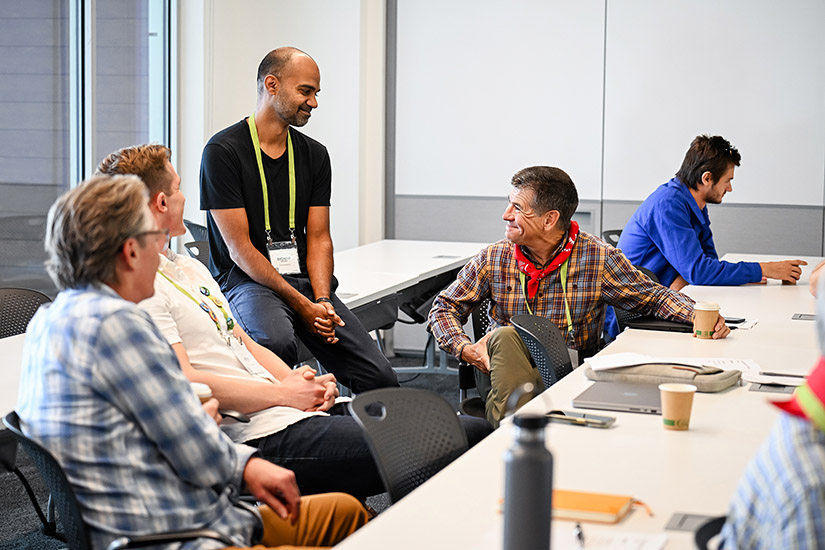
Hgenium CEO Chris Murphy (center, in the red bandana) attends one of the many workshops during Camp Cleantech. Photo by Kira Vos
For Chris Murphy, CEO of Hgenium, his only complaint about Camp Cleantech was there was not enough time.
“Almost every hour there was some workshop I wanted to get something out of,” he said. “It was a chance to meet valuable people and learn crucial skills in a short period of time. It was a lot of return on your investment of time.”
Held Aug. 12–14, 2024, at CSU Spur in Denver, Colorado, Camp Cleantech was hosted by the U.S. Department of Energy National Renewable Energy Laboratory’s (NREL’s) Innovation and Entrepreneurship Center (IEC) and sponsored by Wells Fargo. It brought together 80 leaders of startups with 30 members of the IEC’s Channel Partner network who taught workshops and mentored attending startup founders.
“It’s important to bring our networks together in collaboration with our Channel Partners,” said Trish Cozart, IEC director. “We wanted to make it easy for startups to access all the resources they need in one location.”
Murphy said attending Camp Cleantech upended his assumptions.
“I assumed the national labs were difficult to collaborate with, and I’ve got a very different sense now based on what I saw and heard here,” Murphy said. “I had no idea that a national lab like NREL did this kind of outreach or entrepreneurial support.”
Murphy’s startup, Hgenium, creates green hydrogen by splitting water and using heat from solar, nuclear, or industrial waste heat instead of electricity. He was able to connect with numerous other founders, both in his industry and out, but all driving climate tech to the market. Murphy wasn't alone in appreciating the value of the lessons learned and connections made during the event.
“This is the place for feedback, that’s why it was created,” said Danielle Pascoli, founder and CEO of VERDE Nanomaterials. “It was extremely powerful to get feedback from others who saw my technology and pitch from different perspectives. I learned how to explain my solution to a broader audience and how to communicate clearly with people without sounding super technical.”
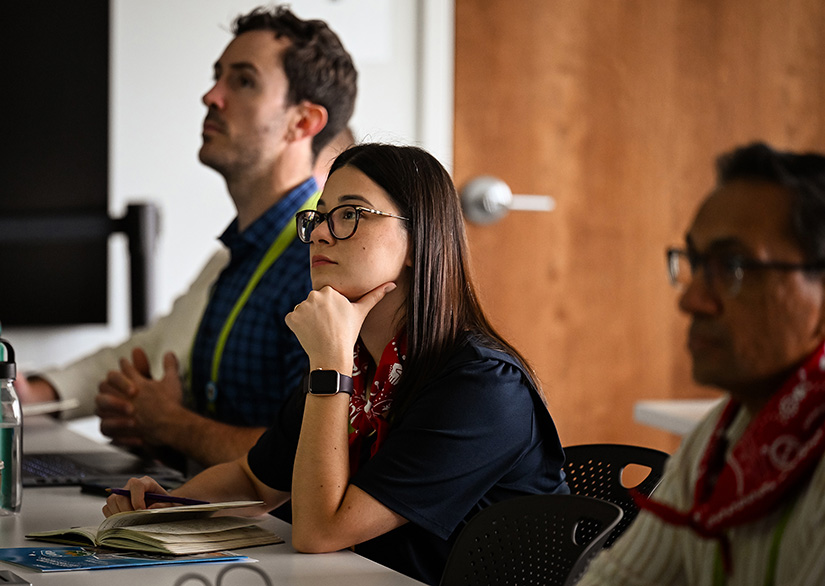
Danielle Pascoli (center), CEO of VERDE Nanomaterials, attends a workshop at Camp Cleantech to learn how to boost her company’s success. Photo by Kira Vos
Pascoli’s company is aiming to replace single-use plastics with a biomaterial created from agricultural waste. VERDE Nanomaterials is working on a process that makes the biomaterial 10 times cheaper than what it sells for today, and Pascoli recently graduated from Cyclotron Road, the Lab-Embedded Entrepreneurship Program (LEEP) at Lawrence Berkeley National Laboratory. Pascoli also attended NREL’s Industry Growth Forum for the first time earlier this year, and that is what made her take a closer look at Camp Cleantech.
“A lot of the programing was a bullseye in terms of what I needed,” Pascoli said. “How do you convince your first customers to adopt a new technology? I could use a full day immersion in this topic.”
Camp Cleantech featured 21 workshops over a day and a half, with topics ranging from building relationships with utilities, to leveraging artificial intelligence for marketing success, to partnering with communities on clean energy projects and manufacturing. One of the most meaningful workshops for Daanaa Resolution CEO Udi Daon was called “Thriving in Chaos—Beyond Resilience,” presented by Climate Connection. The session focused on the mental health and well-being of leaders in the startup space.
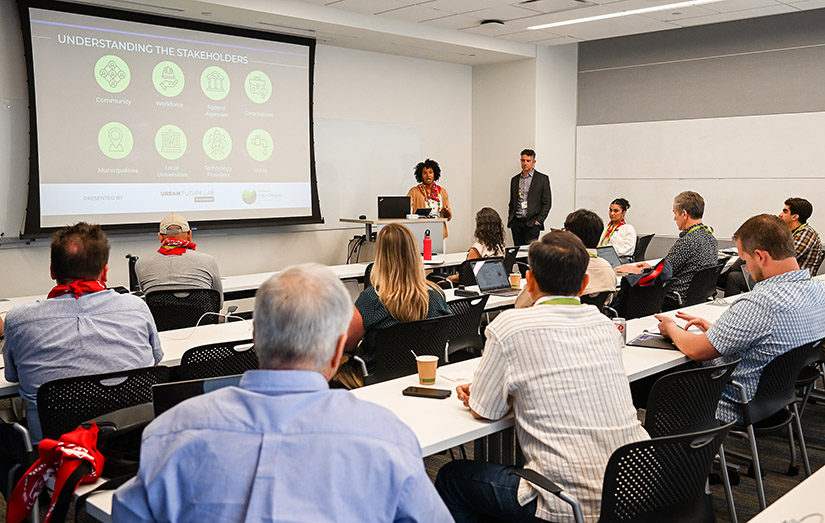
The workshops at Camp Cleantech helped startup leaders develop marketing, business, partnering skills and more. Photo by Kira Vos
“I learned invaluable tools applicable to every person, especially for a leader of a company,” Daon said. “It’s a journey of vulnerability—of exposing yourself to the things that you can be better at. For me, the whole point of coming here is to learn something. One of my takeaways was: How can I provide my team with those tools to go through this journey as well? I believe that’s how you drive change, that’s how you drive faster change, that’s how you are the change. That’s what I’m here for, isn’t it?”
Daanaa created a new power electronics and semiconductors’ topology, consolidating almost all the functions and devices under 1500 V into a single scalable device, which drives efficiencies, reliability, and scalability. Daon says it applies to almost everything but the powerlines and the utility itself, from generation through storage to electric vehicle architecture. During a workshop titled “Winning with the Gatekeepers,” presented by Cleantech Group, Daon joined a conversation about how to gain their trust by acknowledging the challenges for both investors and startups.
“I can’t convince anyone of anything—they need to realize it themselves,” Daon said. “Building trust has less to do with information—building trust has more to do with vulnerability. I’m vulnerable because there’s a bunch of things that I don’t know. If I come vulnerable to a conversation, I can help them open up and learn more. That way, I get a lot more done.”
A majority of the workshops were not lectures but discussions, sometimes with worksheets or breakout groups. The idea was not just to talk to startups but to engage with them to develop necessary skills for success.
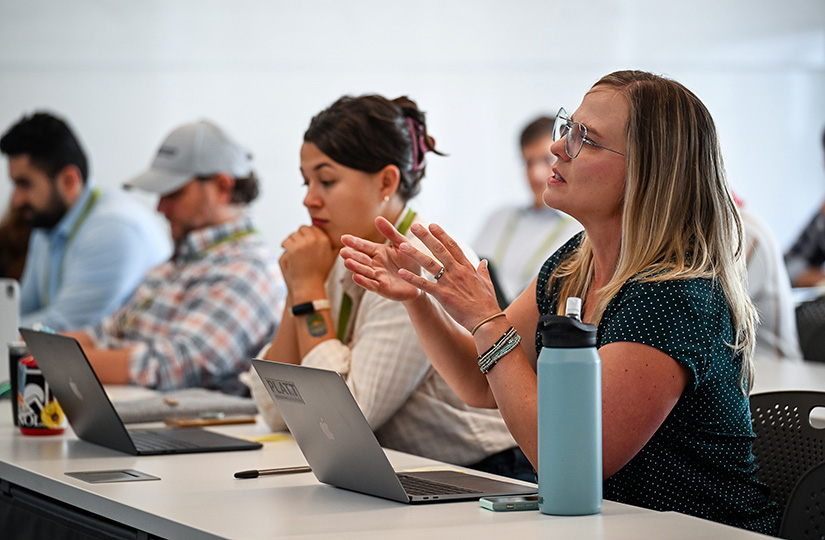
The workshops at Camp Cleantech were not just lectures. They often involved interactive discussions or group exercises. Photo by Kira Vos
Camp Cleantech also featured one-on-one coaching where startups could deliver a mock venture capital pitch to experts from BRITE Energy Innovators, who gave them real-time feedback.
“I will redo my whole pitch after the coaching,” Pascoli said. “I was pitching a story that was too broad, saying our technology could solve all the problems in the world. Turns out, I should start somewhere very specific, so they told me to flip it—start narrow and then go broad. It was a very easy way I could visualize my pitch improving.”
Kaitlyn Suarez, CEO and cofounder of Terra Watts, went to a one-on-one coaching session with Gillian Francis, managing director of Rapid Ventures, which specializes in advising startups on how to handle finances and growth. Francis also ran a workshop titled “Cybersecurity: Avoiding a Major Pitfall on the Way to Commercialization.”
Suarez’s company sends power through the ground without wires. A solar panel generates electricity, drops it into a bore hole, and then uses the rocks and soil to move electricity to a receiver. Right now, Terra Watts is using university resources to keep development going, but Suarez said, “I’m in a little bit of paralysis of what I’m going to do next.” Francis talked about funding options that could help from organizations already in her network.
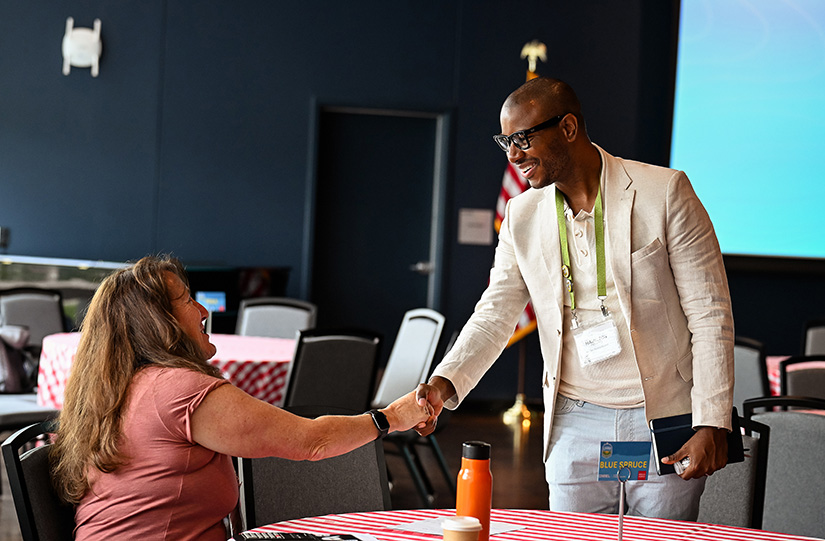
Many Camp Cleantech attendees enjoyed one-on-one sessions with industry professionals to practice their pitches and find ways to make them better. Photo by Kira Vos
Pascoli also found the workshop from Cleantech Open, “Your Customer’s Hero’s Journey: Position for Market Leadership,” very helpful with lessons about storytelling.
“It opened my mind that the technology itself might not matter as much if you don’t know how to communicate in a way that people understand,” she said. “You need to find some kind of common ground so that anyone, including investors, customers, and a broader audience, can understand what you’re doing.”
Grid Catalyst President and Founder Nina Axelson ran a workshop titled “Getting Pilot Ready” to a very full room. Daon was there, and Axelson said he was the only one in the room who raised his hand when she asked if anyone had actually done a pilot before.
“This room is filled with test cases,” Axelson told her audience. “I’m just standing here with the future—no big deal.”
She talked to them not only about planning for success but also planning for failure. She stressed that startups need to know what they will do if an experiment succeeds or fails and how to ensure a company has contingency plans for whatever happens. Axelson also talked about the importance of finding the right type of partner.
“How do you keep from getting high-fived to death if it’s not going to actually help you where you need to go?” Axelson asked the workshop. “If you have the right partner that is at the table with you, they don’t want to see you fail.”
Axelson talked about why organizations like Grid Catalyst are in NREL’s Channel Partner network and want to share their knowledge with startups at Camp Cleantech.
“I think it is an absolute privilege to help startups get their stuff to the market,” she said. “Being in their corner and helping them figure it out makes me deeply happy.”
Most attendees said they plan to attend Camp Cleantech again in the future.
“It was great,” Murphy said. “The workshops were not redundant. I also liked that the whole thing was set up in a way that was very conducive to networking.”
At the event, startup leaders found support amongst each other. Building a company can be a lonely journey, so any sort of support, from their peers or others in the industry, can make a huge difference in the journey to success. Pascoli described Camp Cleantech as a breath of fresh air.
“I got a lot of support, and I feel energized,” she said. “We’re all trying to do very hard things—climate tech. So here, we’re holding each other’s hands going: This is tough, and we’re here for each other.”
To learn more about Camp Cleantech, visit campcleantech.com.
Last Updated May 28, 2025
